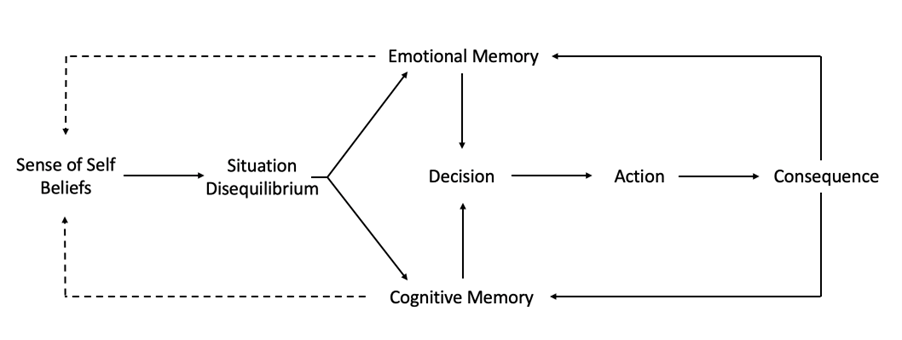Changing Students' Beliefs
Children build-up their understanding of their world through experience and this is gained through their attempts to get their needs met in the environment in which they are raised. Throughout these Newsletters we have continued to explain that the reason for most dysfunctional behaviour is a product of the environment in which the kids were raised. Remember our work does not address those kids who have been born with neuro-atypical brains, things like autism, psychosis and the like; we try to deal with the children whose cognitive structures have been transformed through the interaction with their environment particularly their parents or primary caregivers.
Beliefs about the world are built from experience. When a certain stimulus occurs, a chosen action will get an expected result. So, when we are faced with a situation that needs to be addressed we believe something will happen based on what happened in the past. The illustration below shows this process; we build our beliefs on our emotional and cognitive memories.

For most of us this ability to know what will happen works well and the better people can predict the more intelligent they are deemed to be. The consistent narrative gives us a fundamental view of the world, a sense of consistency, control and cohesion – conditions that give us confidence in the future. In fact, all learning is based on the ability to predict so beliefs are crucial.
But for our belief system to be ‘intelligent’ it must be based on reality of the presenting situation. The issue is that our beliefs are formed in one reality and when we are faced with another it is challenged. When you consider that our beliefs are about actions that help us survive and if we are threatened in the contemporary situation the anxiety that is generated will have us apply those beliefs on which we have relied.
Stress is a critical factor in dealing with anyone’s beliefs. On a purely survival level, when our survival is threatened our cognitive response can be almost instantaneous, we have all experienced the fight/flight reaction when we experience our general adaptive system pouring adrenaline and associated hormones throughout our body to prepare us to act to survive. That quick referral to our memories, beliefs is the extreme of our propensity to rely on our memories rather than the presenting evidence in the environment.
It is hard enough to take account of our beliefs as adults, every night we see intelligent adults arguing about the current political system. It is easy to lampoon some of the more colourful characters; the USA currently have a textbook case. When confronted with the evidence regarding the recent elections a substantial number of people believe the ‘alternative facts’. The results have been deadly and no amount of evidence seems to have made a difference. Change is hard and evidence is insufficient.
The only way that beliefs can be changed is when the evidence is presented in a non-threatening manner importantly by a person or persons with which the individuals have a strong, personal and positive relationship.
So, we return to these kids we work to support; it is clear to classroom teachers that when these kids are not stressed, say in a one-on-one meeting with the school counsellor they will accept that they need to change their behaviours and on a superficial level they really accept this. However, when they return to class and are challenged they invariably return to the behaviours driven by their long-held beliefs!
How to change their beliefs is at the heart of our work. Our model, structure, expectations and relationships provide the scaffold for dealing with this. It does this by:
- Expectations – this teaches how the contemporary environment operates. If you act in a certain way then certain things are most likely to happen.
- Structure – provides the evidence of our expectations. If the student acts in away contrary to the expectation then they experience negative consequences. Likewise if they comply with the expectations they will get the rewards that go with acting appropriately in society.
- Relationships – we have always put relationships as the top priority. If the teacher can build such a relationship, and I believe that occurs if the structure and expectations are delivered consistently and persistently, then it is possible to accept new ways of behaving in certain situations.
This process takes a lot of time; remember it has taken years for the student to get to their current belief structure so be patient, it will take a significant amount of time to make any permanent change.